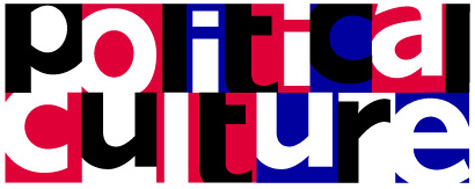
For the first time in a generation, a competitive congressional race is percolating in my Ventura County, CA district. This series explores the local, statewide and national implications of a campaign that was born of voter discontent and might just wind up transforming Congress, and our politics in general. I outlined the parameters of the race here, and a couple weeks ago I interviewed the independent candidate, Linda Parks, who is starting to gain national attention for her quixotic quest.
An overflow audience crowded every inch of sitting and standing room at a local conference hall last Monday night, craning their necks and getting their partisan hackles raised even before the 26th congressional district’s six candidates had entered the room. The scene was a debate — the first and perhaps only one to feature all of those six competitors on the same stage in advance of the June 5 open primary, which will send the top two vote-getters to the general election regardless of party affiliation. Expectations were sky-high amongst the onlookers for a partisan slugfest with a twist … that twist being the presence of a well-known independent candidate who has based her candidacy on pointing out every instance of her rivals’ partisan slugging.
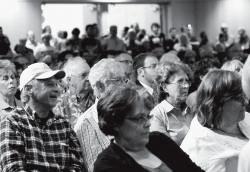 Events pretty much played out as advertised — a steady diet of ideological back-and-forth, simmered with accusations of malfeasance and lack of qualification — and spiced with disrespectful rejoinders from the conservatives in the audience, who at times threatened to turn the proceedings into a 2009-style ”town hall” debacle. The one Republican on the stage, state senator Tony Strickland, behaved like the confident and well-funded frontrunner he is, while the leading Democrat in the race, state assemblywoman Julia Brownley, spent the evening firing off round after caustic round at the liberal bull’s-eye of 2012, the Paul Ryan budget. The independent, Linda Parks, turned every answer into a critique of the two-party system and the disquieting influence of special interests on both Strickland and Brownley’s campaigns. Left sucking for oxygen were two lesser Democratic candidates whose presence can only be described as vanity affairs, while a Hispanic harbor commissioner named Jess Herrera spent the debate struggling valiantly to raise his profile above potential-spoiler status.
Events pretty much played out as advertised — a steady diet of ideological back-and-forth, simmered with accusations of malfeasance and lack of qualification — and spiced with disrespectful rejoinders from the conservatives in the audience, who at times threatened to turn the proceedings into a 2009-style ”town hall” debacle. The one Republican on the stage, state senator Tony Strickland, behaved like the confident and well-funded frontrunner he is, while the leading Democrat in the race, state assemblywoman Julia Brownley, spent the evening firing off round after caustic round at the liberal bull’s-eye of 2012, the Paul Ryan budget. The independent, Linda Parks, turned every answer into a critique of the two-party system and the disquieting influence of special interests on both Strickland and Brownley’s campaigns. Left sucking for oxygen were two lesser Democratic candidates whose presence can only be described as vanity affairs, while a Hispanic harbor commissioner named Jess Herrera spent the debate struggling valiantly to raise his profile above potential-spoiler status.
It was an unusually fiery debate, for these parts — one befitting the national focus that has been placed on this race by the major parties and their PAC cohorts, which are threatening to break previous records for spending by outside entities in a primary for a House seat. But while it accomplished much by allowing the principal candidates to mark their respective partisan (or non-partisan) territories, it didn’t offer voters much reason to like any of them. Strickland, Brownley and Parks walked into that room as ideological archetypes rather than captivating personalities; sadly, while all of them stuck the landings on their talking points, not one of them emerged looking any more attractive as individuals.
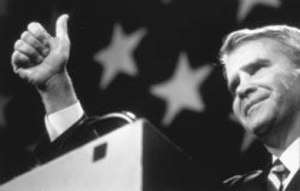 Sixteen years ago a documentary film titled A Perfect Candidate offered a sobering look at the malaise that has swamped contemporary politics — as embodied by the squalid and uninspiring ”leaders” who are driven to compete for money and votes, as well as the uninformed and belligerent voters who elect or reject them. The film was a blow-by-blow account of the 1994 U.S. Senate race in Virginia, which featured two candidates who had entered the race with considerable (if questionably earned) star power: the incumbent, the LBJ in-law and former governor Chuck Robb, and the challenger, the Iran-Contra hero/criminal Oliver North. That election year featured a GOP electorate practically as exuberant in their irrationality as the Tea Partiers of 2010 — and Ollie’s turn as the uniformed, loyal-to-a-fault (and I do mean fault) Reaganite sent conservative activists and funders screaming to the barricades in an effort to get him into the Senate. But the resulting campaign was ugly and desultory, and disillusioning for both sides. The documentary portrayed two out-of-their-depth candidates who were clueless about how to translate expectations into ideas, or how to mobilize their bases for positive action rather than merely to fear and loathe the other side.
Sixteen years ago a documentary film titled A Perfect Candidate offered a sobering look at the malaise that has swamped contemporary politics — as embodied by the squalid and uninspiring ”leaders” who are driven to compete for money and votes, as well as the uninformed and belligerent voters who elect or reject them. The film was a blow-by-blow account of the 1994 U.S. Senate race in Virginia, which featured two candidates who had entered the race with considerable (if questionably earned) star power: the incumbent, the LBJ in-law and former governor Chuck Robb, and the challenger, the Iran-Contra hero/criminal Oliver North. That election year featured a GOP electorate practically as exuberant in their irrationality as the Tea Partiers of 2010 — and Ollie’s turn as the uniformed, loyal-to-a-fault (and I do mean fault) Reaganite sent conservative activists and funders screaming to the barricades in an effort to get him into the Senate. But the resulting campaign was ugly and desultory, and disillusioning for both sides. The documentary portrayed two out-of-their-depth candidates who were clueless about how to translate expectations into ideas, or how to mobilize their bases for positive action rather than merely to fear and loathe the other side.
Unfortunately, a similar dynamic threatens to take hold here in CA-26 this year, because none of the top contenders seems to boast the combination of charisma and inspirational messaging that will send voters streaming to the polls to vote for something, rather than against something else. There is no lefty heroine like Elizabeth Warren in this race, no macho man like Arnold Schwarzenegger to fire conservatives’ loins — not even a Jesse Ventura to mix a spoonful of populist sugar into the medicine of anti-partisan moderation. That dynamic may change after June 5, depending on who’s left standing and how much money is poured into negative advertising. But for now, the three-week race to the primary seems a contest to see which candidate voters will find least compelling at the finish line.
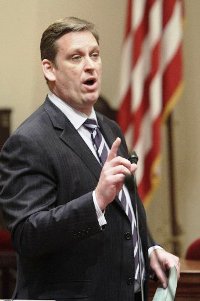 Strickland, for example, is the type of frat-boy conservative — cool and confident in his demeanor, doctrinaire in his ideology, and situational in his ethics when it comes to attracting corporate donors and doling out the quid pro quo — that soothes what’s left of the GOP base while enraging liberals (who call him “Phony Tony”) and lulling moderates to sleep. The message behind every word he spoke so pleasantly and almost robotically during the debate, is: I am a Republican. If you’re a Republican, I believe what you believe, but let’s not talk about it right now. It’s all the message he needs, for the moment, since he’s all but guaranteed a top-two finish in the primary and a smooth transition toward the general election. He’ll get there with his ideas unchallenged and his moneybags bursting with special-interest cash.
Strickland, for example, is the type of frat-boy conservative — cool and confident in his demeanor, doctrinaire in his ideology, and situational in his ethics when it comes to attracting corporate donors and doling out the quid pro quo — that soothes what’s left of the GOP base while enraging liberals (who call him “Phony Tony”) and lulling moderates to sleep. The message behind every word he spoke so pleasantly and almost robotically during the debate, is: I am a Republican. If you’re a Republican, I believe what you believe, but let’s not talk about it right now. It’s all the message he needs, for the moment, since he’s all but guaranteed a top-two finish in the primary and a smooth transition toward the general election. He’ll get there with his ideas unchallenged and his moneybags bursting with special-interest cash.
Brownley, on the other hand, came into the debate with a more complicated mission. A highly regarded state assemblywoman from Santa Monica who recently moved into Ventura County to establish a semblance of local bona fides, she spent a bit of her debate time kicking playfully at the three fellow Democrats nipping at her heels — but mostly she focused on arguing that she, and not the moderate Parks, has the best chance of vanquishing the dreaded Strickland in November. She did so by taking the most pugnacious stance among the candidates, at times railing against the Ryan budget and GOP policies on immigration and women’s issues with a vitriol that must work nicely in front of highly partisan audiences at rallies and fundraisers. Unfortunately for her, this audience was tilted rightward by the presence of several dozen Strickland volunteers — who felt no compunction about yelling ”Liar!” and ”Nonsense!” when Brownley hyperbolized GOP positions on contraception (no, they don’t really want to take away women’s right to use it) and Social Security (in fact, it’s the one area on which the Ryan budget mostly wimps out).
Interestingly, though, it wasn’t only the ruder members of the audience who called Brownley on her more grandiosely partisan moments. It was Parks, who — for all her flaws as a candidate, which will be discussed in a moment — is serving as the conscience of this race. In the presence of an independent, PAC-money-free candidate with a real shot at winning, Brownley’s over-the-top attacks on Republican policies made her seem smaller, not larger. Strickland, to his credit, recognized this — and even joined Parks in condemning the falsehoods in a Democratic Congressional Campaign Committee mailer that had been sent the previous week. Every other candidate on the stage joined him in that criticism, save one — Brownley. She couldn’t, as it turns out, because she had another hit job on Parks at the printer under her own name, which arrived in my mailbox late last week.
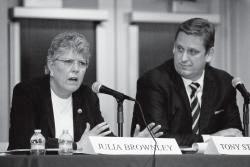 Brownley did manage one effective moment — her closing statement, when she turned the tables on Parks’ pox-on-both-your-houses stance. ”This is not about partisan bickering,” Brownley said. ”This is about two very different visions and sets of values for our country. I am not going to run away from my party’s principles. I’m proud to be a Democrat!” Unfortunately, a Democrat is all Brownley seems to be at this point — like Strickland on the other side, she seems a walking, talking embodiment of major-party talking points, with little to recommend her apart from her guarantee to vote a particular way on every issue that arises.
Brownley did manage one effective moment — her closing statement, when she turned the tables on Parks’ pox-on-both-your-houses stance. ”This is not about partisan bickering,” Brownley said. ”This is about two very different visions and sets of values for our country. I am not going to run away from my party’s principles. I’m proud to be a Democrat!” Unfortunately, a Democrat is all Brownley seems to be at this point — like Strickland on the other side, she seems a walking, talking embodiment of major-party talking points, with little to recommend her apart from her guarantee to vote a particular way on every issue that arises.
For her own part, Parks’ debate performance reinforced the odd cocktail of schoolmarmishness and blow-up-the-system anarchy that characterized our interview a couple weeks ago. She has a healthy, if perhaps elevated, understanding of what a victory would mean — both for herself, as a Capitol Hill embodiment of Kevin Costner in that awful movie Swing Vote, and for our district, which she frequently urges to ”make history” by pulling the lever for her. Unfortunately, as it is with Strickland and Brownley, Parks as a candidate so far works better in theory than in practice.
When an independent — even one like Parks, who has won every (nonpartisan) election she’s ever entered — launches a campaign without a natural ideological constituency, it behooves her to ladle out a hefty dollop of the common touch. A person in her position really needs to be able to ask voters, ”Don’t you wish there were more people like me in Congress?” and get an enthusiastic response in the affirmative. But Parks is humorless, and something of a scold, as she delivers her critiques of Washington partisanship and corruption. ”I’m not taking any special-interest or PAC money,” she says at least six times an hour — but even when the next line out of her mouth is about doing the people’s work, the next line people take away seems to be, ”… and doesn’t that make me better than everybody else, nyah nyah nyah.” Walking back toward my car, I must have heard at least three people say some version of, ”I just don’t like that Linda Parks.”
Personally, I don’t know if I’d go that far — after all, I do admire what Parks is trying to accomplish, and I have plenty of friends who are rather humorless (you probably don’t know who you are). But her above-it-all attitude (complete with occasional, Al Gore-style eye rolls) several times had me looking at the three ”minor” candidates in the debate and wishing one of them would say, ”Yeah, well, Linda, I’m not taking any special-interest or PAC money, either — mostly because nobody’s offering it to me.”
 As onlookers frequently wind up doing at these crowded-stage debates, I found my mind wandering from the frontrunners and looking to those ”minor” candidates for inspiration. I discovered it in Jess Herrera. Unlike Brownley, who is a modern, keep-the-coalition-together Democrat who feels compelled to hit every liberal touchstone while trolling for female/ethnic/gay/older/younger/tree-hugging votes, Herrera is an old-school, New Deal Democrat. He found his calling among his fellow military grunts as a young man, and on the docks among his fellow longshoremen in the years that followed. Eventually he came to represent them on the Oxnard Harbor Commission — and he spent much of his debate time introducing voters to his background and offering concrete examples of the ways in which he has brought individuals, industry and government together to solve actual problems in a way that benefited each party.
As onlookers frequently wind up doing at these crowded-stage debates, I found my mind wandering from the frontrunners and looking to those ”minor” candidates for inspiration. I discovered it in Jess Herrera. Unlike Brownley, who is a modern, keep-the-coalition-together Democrat who feels compelled to hit every liberal touchstone while trolling for female/ethnic/gay/older/younger/tree-hugging votes, Herrera is an old-school, New Deal Democrat. He found his calling among his fellow military grunts as a young man, and on the docks among his fellow longshoremen in the years that followed. Eventually he came to represent them on the Oxnard Harbor Commission — and he spent much of his debate time introducing voters to his background and offering concrete examples of the ways in which he has brought individuals, industry and government together to solve actual problems in a way that benefited each party.
His story was refreshing, his rhetoric honest and inspiring … his defense of his qualifications a withering rejection of the received wisdom about what type of person should go to Congress … and yet, of course, he has no chance of getting past the primary to the general election. He is, at best, a niche candidate — likely to appeal to Hispanics in the western part of the county, but to few others who make up the contemporary Democratic coalition. His best chance to keep his name in the news past June 6 is if he siphons off enough of the Hispanic vote to boost Parks past Brownley into the general election — and if that happens, as far as local and national Democrats are concerned, his name in the news will be ”Mud.”
Brownley’s best chance of avoiding that fate is to barrage potential Parks supporters with negative information about her — an ugly task that she and the national Democratic Party have embraced whole- (if cold-) heartedly, resulting in a deluge of attack mailers that have been stacking up on my desk for the last two weeks. The next column in this series will discuss those mailers, the strategies and risks behind them, and the astonishing — and perhaps unprecedented, at least during a primary campaign — antagonism that has developed between Democrats and an independent who, when push comes to shove, shares most of their views.
For now, though, the race continues forward from the benchmark moment of last week’s debate. It’s certainly a race to watch — more than $1 million of national PAC money already attests to that — but I wish it was a race to love watching. It speaks volumes about the state of our politics that, in our county’s first-in-a-generation competitive congressional campaign, those few of us who are paying close attention have already felt our enthusiasm meters plummeting toward zero.





Comments